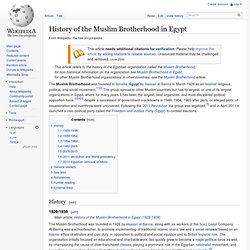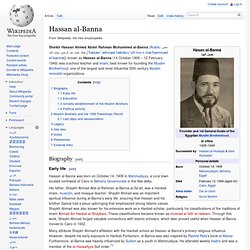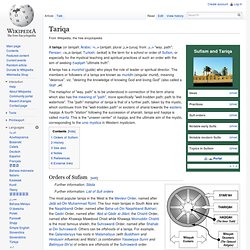

History of the Muslim Brotherhood in Egypt. This article refers to the history of the Egyptian organisation called the Muslim Brotherhood; for non-historical information on the organization see Muslim Brotherhood in Egypt; for other Muslim Brotherhood organizations in other countries, see the Muslim Brotherhood article.

History[edit] 1928-1938[edit] The Muslim Brotherhood was founded in 1928 by Hassan al-Banna, along with six workers of the Suez Canal Company. Al-Banna was a schoolteacher, to promote implementing of traditional Islamic sharia law and a social renewal based on an Islamic ethos of altruism and civic duty, in opposition to political and social injustice and to British imperial rule. 1939-1954[edit] In November 1948 police seized an automobile containing the documents and plans of what is thought to be the Brotherhood's `secret apparatus` with names of its members. 1954-1982[edit] Qutb became the Brotherhood's most influential thinker. 1982-2005[edit] In 2000, 15 MB deputies were elected to the Egyptian parliament.
Hassan al-Banna. Sheikh Hassan Ahmed Abdel Rahman Muhammed al-Banna (Arabic: حسن أحمد عبد الرحمن محمد البنا, IPA: [ˈħæsæn ˈæħmæd ʕæbdeɾɾˤɑħˈmɑːn mæˈħæmmæd elˈbænnæ]) known as Hassan al-Banna (14 October 1906 – 12 February 1949) was a school teacher and imam, best known for founding the Muslim Brotherhood, one of the largest and most influential 20th century Muslim revivalist organizations.

Biography[edit] Early life[edit] Hassan al-Banna was born on October 14, 1906 in Mahmudiyya, a rural town located northwest of Cairo in Beheira Governorate in the Nile delta. His father, Shaykh Ahmad Abd al-Rahman al-Banna al-Sa'ati, was a Hanbali imam, muezzin, and mosque teacher. Shaykh Ahmad was an important spiritual influence during al-Banna's early life, ensuring that Hassan and his brother Gamal had a pious upbringing that emphasized strong Islamic values. Many attribute Shaykh Ahmad's affiliation with the Hanbali school as Hassan al-Banna's primary religious influence. Education[edit] Political activity[edit] Tariqa. A tariqa (or tariqah; Arabic: طريقة ṭarīqah, plural طرق ṭuruq, from طريق "way, path"; Persian: طريقت tariqat, Turkish: tarikat) is the term for a school or order of Sufism, or especially for the mystical teaching and spiritual practices of such an order with the aim of seeking ḥaqīqah "ultimate truth".

A tariqa has a murshid (guide) who plays the role of leader or spiritual director. The members or followers of a tariqa are known as murīdīn (singular murīd), meaning "desirous", viz. "desiring the knowledge of knowing God and loving God" (also called a faqīr فقير) The metaphor of "way, path" is to be understood in connection of the term sharia which also has the meaning of "path", more specifically "well-trodden path; path to the waterhole". The "path" metaphor of tariqa is that of a further path, taken by the mystic, which continues from the "well-trodden path" or exoteric of sharia towards the esoteric haqiqa.
Orders of Sufism[edit] History[edit] Certain scholars, e.g., G. Notes[edit]